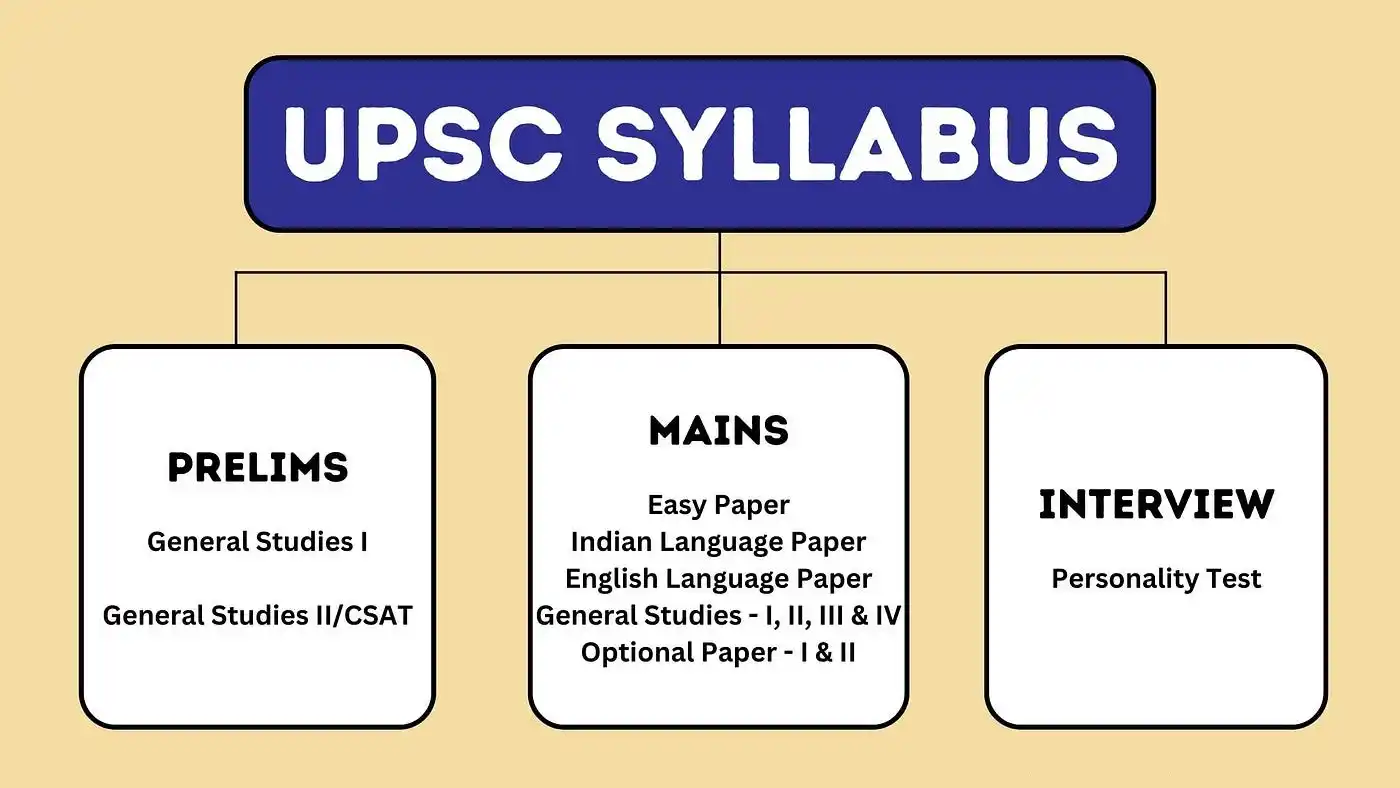UPSC Syllabus 2024: The Union Public Service Commission (UPSC) is the constitutional body responsible for recruiting top-level officers for various government posts in India. Every year, lakhs of aspirants participate in the UPSC Civil Services Examination to fulfill their dream of becoming a civil servant.
To achieve success in this highly competitive exam, it is essential to have a thorough understanding of the UPSC syllabus. This article provides a comprehensive guide to the UPSC syllabus, providing an in-depth overview of its structure, subjects, and valuable tips for effective preparation.
Understanding the UPSC Exam
The UPSC Civil Services Examination is conducted in three stages: the Preliminary Examination, the Main Examination, and the Personality Test (Interview). The Preliminary Examination, commonly known as the UPSC Prelims, consists of two objective-type papers, while the Main Examination (UPSC Mains) comprises nine descriptive papers. The Prelims are meant to screen candidates for the Mains, which, in turn, determines eligibility for the final Personality Test.
The UPSC Syllabus: An Overview
The UPSC syllabus is vast and covers a wide range of subjects. It assesses a candidate’s aptitude, knowledge, and understanding of various issues. The syllabus is divided into two stages – Prelims and Mains. Let’s delve deeper into the specifics of each stage.
Download UPSC Exams Free PDF Annual Calendar 2024
UPSC Preliminary Examination Syllabus
- 3.1 General Studies Paper I
- History and Indian National Movement
- Geography and Environment
- Indian Polity and Governance
- Economic and Social Development
- General Science
- 3.2 General Studies Paper II (CSAT)
- Comprehension
- Interpersonal Skills including Communication Skills
- Logical Reasoning and Analytical Ability
- Decision Making and Problem Solving
- General Mental Ability
- Basic Numeracy and Data Interpretation
UPSC Mains Examination Syllabus
The UPSC Mains Examination is a significant challenge that assesses a candidate’s depth of knowledge and understanding of various subjects. The syllabus is as follows:
- 4.1 Paper A: Indian Language (Qualifying in nature)
- 4.2 Paper B: English (Qualifying in nature)
- 4.3 Essay
- 4.4 General Studies I
-
- Indian Heritage and Culture
- History and Geography of the World and Society
- Governance, Constitution, Polity, Social Justice, and International Relations
- 4.5 General Studies II
-
- Governance
- Constitution
- Polity
- Social Justice
- International Relations
- 4.6 General Studies III
-
- Technology
- Economic Development
- Biodiversity
- Environment
- Security and Disaster Management
- 4.7 General Studies IV
-
- Ethics
- Integrity
- Aptitude
- 4.8 Optional Subject Paper I 5.9 Optional Subject Paper II
Optional Subject Syllabus
Candidates have the option to choose one optional subject from a wide range of disciplines. The list includes subjects like History, Geography, Public Administration, Sociology, Political Science, Literature, Mathematics, and many more. The optional subject consists of two papers, each carrying 250 marks, making a total of 500 marks.
Preparing for the UPSC Exam
Preparing for the UPSC examination requires dedication, commitment, and strategic planning. Here are some essential tips to help you make the most of your preparation:
- 6.1 Understand the Syllabus: Analyze the UPSC syllabus thoroughly, identify the essential topics, and prioritize them based on your strengths and weaknesses.
- 6.2 Create a Study Plan: Design a well-structured study plan that covers all the subjects and allows sufficient time for revision and practice.
- 6.3 Refer to Standard Books: Rely on authentic and recommended textbooks and study materials to build a strong foundation in each subject.
- 6.4 Current Affairs: Stay updated with current affairs by reading newspapers, magazines, and other reliable sources regularly.
- 6.5 Practice Mock Tests: Take regular mock tests to improve your time management and problem-solving skills.
- 6.6 Revise Regularly: Revision is crucial; make it a habit to revise topics at regular intervals to retain information effectively.
Tips for Effective Preparation
Transition words play a crucial role in enhancing the readability of the content. To make the content more user-friendly and engaging, use transition words such as ‘however,’ ‘furthermore,’ ‘additionally,’ ‘similarly,’ ‘nevertheless,’ ‘consequently,’ and ‘moreover’ while discussing different points or moving from one idea to another.
Transitioning from the tips for effective preparation to the concluding section, it is evident that the UPSC syllabus is the backbone of the Civil Services Examination. Aspiring candidates should not only comprehend the topics but also adopt a systematic and focused approach to their preparation. By incorporating the recommended transition words into your essay or answers during the exam, you can showcase clarity and coherence, which are vital aspects of effective communication.
- The Civil Services Examination is not just a test of knowledge but also an evaluation of one’s analytical, decision-making, and problem-solving abilities. Therefore, it is imperative to study and understand the topics in-depth, rather than merely memorizing facts.
- Throughout your preparation journey, it is natural to face challenges and occasional setbacks. However, remember that persistence and a positive mindset will ultimately lead to success. Embrace failures as opportunities to learn and grow, and keep pushing forward.
- Furthermore, make use of available resources such as study materials, online forums, and coaching institutions. Engaging in discussions and seeking guidance from mentors can provide valuable insights and different perspectives on complex topics.
- Moreover, it is crucial to maintain a healthy work-life balance during your preparation period. Taking regular breaks, pursuing hobbies, and staying physically active can help you stay rejuvenated and focused.
- The UPSC syllabus is an extensive and diverse curriculum that requires diligent effort, discipline, and dedication to master. By structuring your preparation and using transition words to enhance the flow of your content, you can improve your chances of performing well in the examination.
- To recap, start by understanding the exam pattern and syllabus thoroughly. Create a study plan tailored to your strengths and weaknesses, and stay committed to your schedule. Utilize authentic study materials and stay updated with current affairs to stay informed.
- Practice regularly with mock tests to hone your time management and problem-solving skills. Focus on conceptual understanding and engage in regular revisions to reinforce your knowledge.
- Throughout your preparation, maintain a positive attitude and remain motivated despite any challenges you encounter. Seek support from mentors, friends, and family to keep you on track. And most importantly, believe in your abilities and have faith in your preparation.
- In the end, remember that success in the UPSC Civil Services Examination is not merely about securing a rank, but also about the opportunity to serve the nation and make a meaningful impact on society.
- So, take a deep breath, gather your determination, and embark on this transformative journey with conviction. As you delve into the vast expanse of the UPSC syllabus, know that you are not alone in your pursuit of excellence. Countless aspirants have walked this path before you, and many more will follow. It is your dedication, perseverance, and strategic approach that will set you apart and lead you to success.
- As you prepare to write your story in the annals of the Civil Services Examination, remember that success is not an endpoint but a continuous process of growth and evolution. Embrace each step of your preparation, and let the UPSC syllabus be your guiding compass on this extraordinary expedition toward realizing your dreams.
- May your journey be filled with wisdom, knowledge, and accomplishments, and may you emerge as a beacon of hope and change for the nation. Best of luck in your UPSC endeavors!
PCS Full Form is Provincial Civil Service. It is a state-level administrative service in India that operates under the control of the state government. Officers in the PCS are responsible for implementing government policies and maintaining law and order within their respective states. To join PCS, candidates must clear the state’s civil services examination, which is conducted by the State Public Service Commission. PCS officers play a vital role in the administration of districts, and their duties range from revenue collection to development planning. The PCS full form highlights the significance of these officers in state governance.
Conclusion
In conclusion, the UPSC syllabus is a comprehensive roadmap for aspirants aiming to clear the Civil Services Examination. Understanding the syllabus in detail, focusing on conceptual clarity, and adopting effective preparation strategies are the keys to success. Remember, success in the UPSC exam requires perseverance, hard work, and a positive attitude. With determination and the right approach, you can conquer this prestigious exam and embark on a fulfilling career as a civil servant. Good luck!
UPSC Syllabus Frequently Asked Questions Answered
The UPSC syllabus refers to the comprehensive curriculum prescribed by the Union Public Service Commission (UPSC) for the Civil Services Examination. It outlines the subjects and topics that candidates need to study to be eligible for various government posts in India.
The UPSC syllabus is divided into two stages: the Preliminary Examination and the Main Examination. The Preliminary Examination consists of two papers - General Studies Paper I and General Studies Paper II (CSAT). The Main Examination consists of nine papers, including Essays, General Studies, and Optional Subject papers.
The UPSC Prelims cover a wide range of subjects, such as History and Indian National Movement, Geography and Environment, Indian Polity and Governance, Economic and Social Development, and General Science, among others.
The UPSC Mains Examination includes nine papers. These papers are Indian Language (Qualifying), English (Qualifying), Essay, General Studies I, General Studies II, General Studies III, General Studies IV, and two Optional Subject papers.
Candidates have the freedom to choose one optional subject from a list of subjects provided by the UPSC. Popular optional subjects include History, Geography, Public Administration, Sociology, and Political Science, among others.
The core areas of the UPSC syllabus remain relatively consistent from year to year. However, minor changes or updates may occur, and candidates are advised to stay updated with official notifications from the UPSC.
Yes, the Indian Language and English papers in the UPSC Mains are qualifying in nature. Candidates must score the minimum marks prescribed by the UPSC in these papers to be eligible for the evaluation of other papers.
To prepare effectively for the UPSC exam, start by thoroughly understanding the syllabus. Create a well-structured study plan, refer to standard books and study materials, stay updated with current affairs, and practice mock tests regularly to improve your time management and problem-solving skills.
Conceptual understanding is crucial for the UPSC exam. The questions in the exam are designed to test candidates' analytical, decision-making, and problem-solving abilities. Rote memorization may not be sufficient; candidates should focus on understanding the core concepts to answer questions effectively. What is the UPSC syllabus?
How is the UPSC syllabus structured?
What subjects are covered in the UPSC Preliminary Examination?
What does the UPSC Mains Examination comprise?
How can I choose an optional subject for the UPSC exam?
Is the UPSC syllabus the same every year?
Are there any qualifying papers for the UPSC Mains Examination?
How can I effectively prepare for the UPSC exam?
How important is conceptual understanding in the UPSC exam?





